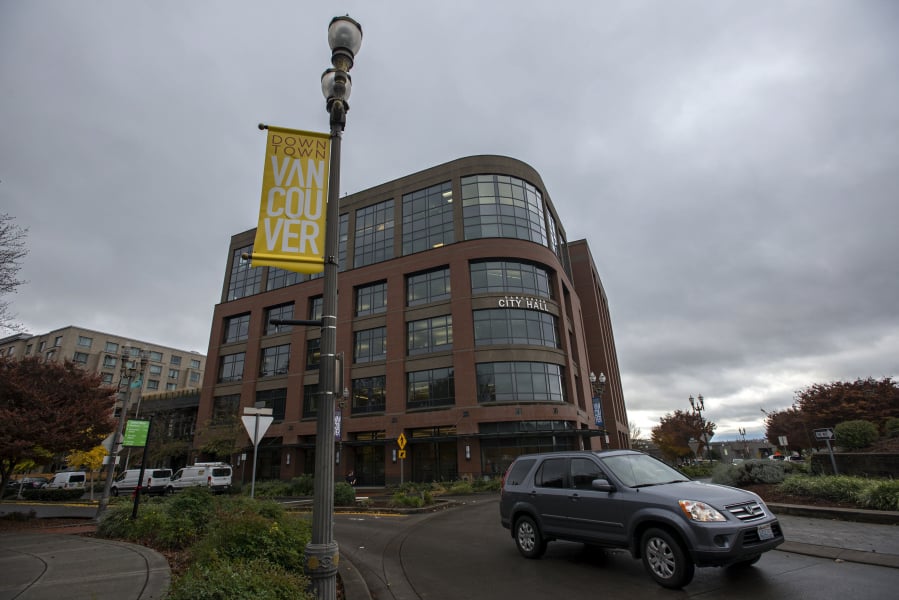Vancouver’s downtown is set to gain more than 700 parking spaces over the next three years, in a series of projects that includes squeezing angled parking onto wide streets and partnering with private companies to build parking garages.
The city’s parking strategy includes coaxing people out of their cars, too — expanding transit options, making the downtown area more walkable and raising parking rates.
The plan indicates an inherent tension in creating a strategy for parking. How do planners weigh the immediate needs of drivers with the city’s long-term goal of reducing the number of cars?
“This is really a balancing act. We’re trying to make sure there’s enough parking that’s available and convenient and easy to find, but not too much that it detracts from active uses. We don’t want a sea of parking lots that create dead zones,” said Community and Economic Development Director Chad Eiken.
In a presentation to the city council Monday evening, Parking Manager Steve Kaspan and Eiken laid out the city’s six-point strategy for improving parking conditions in downtown Vancouver.
The plan includes maximizing on-street parking, increasing the supply of on-street and off-street spaces when possible, increasing monthly and hourly parking rates, providing incentives to downtown businesses to reduce parking demand, enhancing wayfinding signs for visitors and working with private contractors to build parking structures.
Increasing supply
This summer, some streets in downtown Vancouver wide enough to accommodate angled parking spaces will be re-striped, switching them over from less efficient parallel parking for a net gain of around 80 spaces.
The change will add 29 parking spots on West Evergreen Boulevard, and 21 on nearby arterial roads. Another 22 spaces will be added around King Street, and eight other spaces will be added in a short stretch of West 13th Street near Main Street.
Most of those spaces will be designated for employees who work at nearby businesses rather than short-term shoppers or visitors. The work is set to be completed by the end of the summer.
“This project would definitely help demand for employee parking downtown,” Kaspan said.
Also set to wrap up this summer is a city-owned, 121-space parking lot located just west of City Hall. The lot would accommodate city employees, who pay $50 a month for permits. A limited number of monthly permit spaces would be opened up for the general public.
The city is also studying the possibility of a private-sector partnership that would transform the empty lot at 15th and Main streets into a temporary parking lot to be used during the construction of a new apartment complex at Providence Academy. The construction would displace an estimated 176 private parking spaces, and the lot at 15th and Main could accommodate 126 of them.
In the long run, Vancouver is considering large-scale partnerships with private-sector companies. One would see a 740-space, seven-story parking garage on Block 7 of The Waterfront Vancouver development, set to open in late 2021.
“This is all ripe for redevelopment.” Eiken said. “Now that the waterfront has some momentum of its own, studies suggest that now is a good time to move forward on these.”
Another proposal, still in early stages, would build a garage at Terminal 1, owned by the Port of Vancouver, and create more than 900 parking spots.
All told, Eiken and Kaspan predicted that the city will add 1,067 parking spaces and lose up to 343 over the next few years.
Reducing demand
Starting on Jan. 1, 2020, monthly public parking rates will start to increase by $5 a year in an attempt to bring the city’s surface lot rates in line with privately owned ones.
“If we have waiting lists — which we do — then the price is too low,” Kaspan said.
Another solution to reduce the demand for downtown parking comes in the form of zippy electric vans that already contract with businesses to transport employees to satellite lots.
The company Rethink Your Drive, or RYD, is launching an app this month and plans to start promoting public use of the service in August. While the company’s fleet of four vehicles would be occupied during peak commuter hours, the service would be free and open to the public during midday.
“During the day, as vehicles are available, it would be a free service and they would shuttle people to wherever they want to go downtown,” Eiken said.
The discussion over parking is philosophical as well as practical. While councilors agreed that the growing population of employees, visitors and residents need a place to park their cars, some wondered what the prioritization of parking over other uses of land would mean for the character of Vancouver.
It’s folly, Councilor Ty Stober said, to think of parking as something other than one of many tools to increase access.
“It’s about, do I have access to get there? Parking is one way,” Stober said.
“I think we’re finding ourselves in a transition point, here, in transportation system preferences.”
Eiken agreed that the city is at a crossroads. But at the end of the day, people need to get where they’re going, he added.
“We want the parking system to support a livable downtown, an active downtown that’s also sustainable. We know there’s improvements that need to be made to mobility and transit that give people options,” Eiken said. “Right now, if you were to ask people how they get to work if they didn’t drive, many would be challenged to get from their neighborhood to downtown.”




